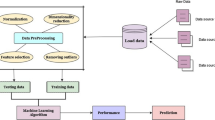Abstract
Machine learning is increasingly present in different sectors. Decision-making processes that occur in all types of companies and entities can be improved with the use of AI algorithms and machine learning. Furthermore, the application of machine learning algorithms enables the possibility of providing support to automate the undertaking of complex tasks. However, not all users who want to use machine learning are skilled enough from a technological and data science point of view to use many of the tools that are already available on the market. In particular, the health sector is taking advantage of AI algorithms to enhance the decision-making processes and to support complex common activities. Nonetheless, physicians have the domain knowledge but are not deeply trained in data science. This is the case of the cardiology department of the University Hospital of Salamanca, where the large amount of anonymized data makes it possible to improve certain tasks and decision-making. This work describes a machine learning platform to assist non-expert users in the definition and application of ML pipelines. The platform aims to fill data science gaps while automatizing ML pipelines and provides a baseline to integrate it with other developed applications for the cardiology department.
Access this chapter
Tax calculation will be finalised at checkout
Purchases are for personal use only
Similar content being viewed by others
References
Litjens, G., et al.: A survey on deep learning in medical image analysis. Med. Image Anal. 42, 60–88 (2017). https://doi.org/10.1016/j.media.2017.07.005
González Izard, S., Sánchez Torres, R., Alonso Plaza, Ó., Juanes Méndez, J.A., García-Peñalvo, F.J.: Nextmed: automatic imaging segmentation, 3D reconstruction, and 3D model visualization platform using augmented and virtual reality. Sensors (Basel) 20(10), 2962 (2020). https://doi.org/10.3390/s20102962
Izard, S.G., Juanes, J.A., García Peñalvo, F.J., Estella, J.M.G., Ledesma, M.J.S., Ruisoto, P.: Virtual reality as an educational and training tool for medicine. J. Med. Syst. 42(3), 1–5 (2018). https://doi.org/10.1007/s10916-018-0900-2
Abadi, M., et al.: TensorFlow: a system for large-scale machine learning. In: 12th USENIX Symposium on Operating Systems Design and Implementation OSDI 16, pp. 265–283. USENIX Association, Savannah (2016)
Anil, R., et al.: Apache mahout: machine learning on distributed dataflow systems. J. Mach. Learn. Res. 21(127), 1–6 (2020)
Bisong, E.: Google colaboratory. In: Building Machine Learning and Deep Learning Models on Google Cloud Platform: A Comprehensive Guide for Beginners, pp. 59–64. Apress, Berkeley (2019). https://doi.org/10.1007/978-1-4842-4470-8_7
Frank, E., et al.: Weka-a machine learning workbench for data mining. In: Maimon, Oded, Rokach, Lior (eds.) Data Mining and Knowledge Discovery Handbook, pp. 1269–1277. Springer, Boston (2010). https://doi.org/10.1007/978-0-387-09823-4_66
Hall, M., Frank, E., Holmes, G., Pfahringer, B., Reutemann, P., Witten, I.H.: The WEKA data mining software: an update. SIGKDD Explor. Newsl. 11(1), 10–18 (2009). https://doi.org/10.1145/1656274.1656278
Bjaoui, M., Sakly, H., Said, M., Kraiem, N., Bouhlel, M.S.: Depth insight for data scientist with RapidMiner «an innovative tool for AI and big data towards medical applications». Paper presented at the Proceedings of the 2nd International Conference on Digital Tools & Uses Congress, Virtual Event, Tunisia (2020)
McCormick, K., Salcedo, J.: IBM SPSS Modeler Essentials: Effective Techniques for Building Powerful Data Mining and Predictive Analytics Solutions. Packt Publishing Ltd., Birmingham (2017)
Berthold, M., et al.: KNIME - the Konstanz information miner: version 2.0 and beyond. ACM SIGKDD Explor. Newsl. 11(1), 26–31 (2009). https://doi.org/10.1145/1656274.1656280
Rodríguez-García, J.D., Moreno-León, J., Román-González, M., Robles, G.: Evaluation of an online intervention to teach artificial intelligence with LearningML to 10–16-Year-old students. In: Proceedings of the 52nd ACM Technical Symposium on Computer Science Education. Association for Computing Machinery, pp 177–183 (2021). https://doi.org/10.1145/3408877.3432393
García-Peñalvo, F., et al.: Application of artificial intelligence algorithms within the medical context for non-specialized users: the CARTIER-IA platform. Int. J. Interact. Multimed. Artif. Intell. 6(6), 46 (2021)
Vázquez-Ingelmo, A., et al.: Usability study of CARTIER-IA: a platform for medical data and imaging management. In: Zaphiris, P., Ioannou, A. (eds.) HCII 2021. LNCS, vol. 12784, pp. 374–384. Springer, Cham (2021). https://doi.org/10.1007/978-3-030-77889-7_26
García-Holgado, A., García-Peñalvo, F.J.: Validation of the learning ecosystem metamodel using transformation rules. Futur. Gener. Comput. Syst. 91, 300–310 (2019). https://doi.org/10.1016/j.future.2018.09.011
García-Holgado, A., García-Peñalvo, F.J.: A metamodel proposal for developing learning ecosystems. In: Zaphiris, P., Ioannou, A. (eds.) LCT 2017. LNCS, vol. 10295, pp. 100–109. Springer, Cham (2017). https://doi.org/10.1007/978-3-319-58509-3_10
Carroll, J.: Making Use: Scenario-Based Design of Human-Computer Interactions. The MIT Press, Cambridge (2000)
Buitinck, L., et al.: API design for machine learning software: experiences from the scikit-learn project. Paper presented at the ECML PKDD Workshop: Languages for Data Mining and Machine Learning (2013)
Scikit-Learn: Choosing the right estimator - Scikit-Learn documentation (2020)
Pernice, K.: UX Prototypes: Low Fidelity vs. High Fidelity (2016)
Krueger, R.A., Casey, M.A.: Focus Groups: A Practical Guide for Applied Research. Sage publications, Focus group. Usability.gov (2014). https://www.usability.gov/how-to-and-tools/methods/focus-groups.html. Accessed 12 June 2021
Kuhn, K.: Problems and benefits of requirements gathering with focus groups: a case study. Int. J. Hum.-Comput. Interact. 12(3–4), 309–325 (2000). https://doi.org/10.1080/10447318.2000.9669061
García-Peñalvo, F.J., Corell, A., Abella-García, V., Grande-de-Prado, M.: Online assessment in higher education in the time of COVID-19. Educ. Knowl. Soc. 21 (2020). https://doi.org/10.14201/eks.23086
Fardoun, H., González-González, C.S., Collazos, C.A., Yousef, M.: Exploratory study in iberoamerica on the teaching-learning process and assessment proposal in the pandemic times. Educ. Knowl. Soc. 21 (2020). https://doi.org/10.14201/eks.23437
García-Peñalvo, F.J., Corell, A., Rivero-Ortega, R., Rodríguez-Conde, M.J., Rodríguez-García, N.: Impact of the COVID-19 on higher education: an experience-based approach. In: García-Peñalvo, F.J. (ed.) Information Technology Trends for a Global and Interdisciplinary Research Community, pp. 1–18. IGI Global, Hershey (2021)
Author information
Authors and Affiliations
Corresponding author
Editor information
Editors and Affiliations
Rights and permissions
Copyright information
© 2021 Springer Nature Switzerland AG
About this paper
Cite this paper
García-Holgado, A. et al. (2021). User-Centered Design Approach for a Machine Learning Platform for Medical Purpose. In: Ruiz, P.H., Agredo-Delgado, V., Kawamoto, A.L.S. (eds) Human-Computer Interaction. HCI-COLLAB 2021. Communications in Computer and Information Science, vol 1478. Springer, Cham. https://doi.org/10.1007/978-3-030-92325-9_18
Download citation
DOI: https://doi.org/10.1007/978-3-030-92325-9_18
Published:
Publisher Name: Springer, Cham
Print ISBN: 978-3-030-92324-2
Online ISBN: 978-3-030-92325-9
eBook Packages: Computer ScienceComputer Science (R0)




